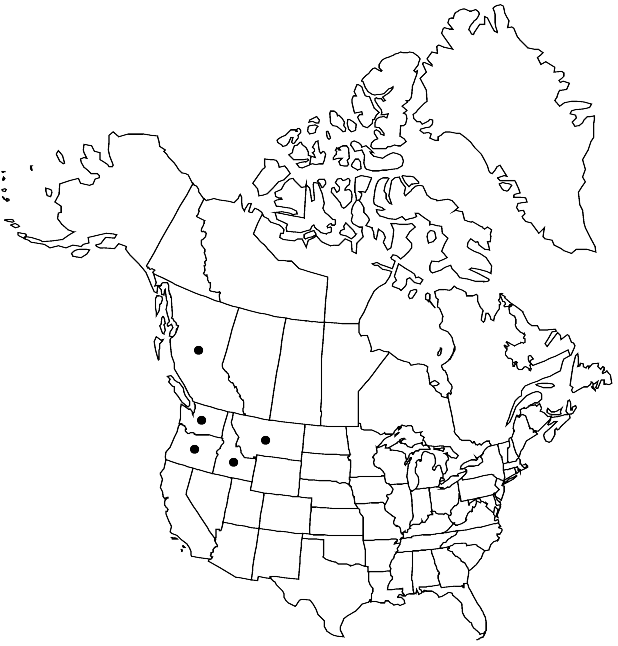Difference between revisions of "Physaria douglasii"
Novon 12: 322. 2002.
FNA>Volume Importer |
RevisionBot (talk | contribs) m (Bot: Adding category Revised Since Print) |
||
| (5 intermediate revisions by 3 users not shown) | |||
| Line 11: | Line 11: | ||
|name=Lesquerella douglasii | |name=Lesquerella douglasii | ||
|authority=S. Watson | |authority=S. Watson | ||
| + | |rank=species | ||
|publication_title=Proc. Amer. Acad. Arts | |publication_title=Proc. Amer. Acad. Arts | ||
|publication_place=23: 255. 1888 | |publication_place=23: 255. 1888 | ||
| Line 25: | Line 26: | ||
-->{{Treatment/Body | -->{{Treatment/Body | ||
| − | |distribution= | + | |distribution=B.C.;Idaho;Mont.;Oreg.;Wash. |
|discussion=<p>Subspecies 2 (2 in the flora).</p> | |discussion=<p>Subspecies 2 (2 in the flora).</p> | ||
|tables= | |tables= | ||
| Line 49: | Line 50: | ||
-->{{#Taxon: | -->{{#Taxon: | ||
name=Physaria douglasii | name=Physaria douglasii | ||
| − | |||
|authority=(S. Watson) O’Kane & Al-Shehbaz | |authority=(S. Watson) O’Kane & Al-Shehbaz | ||
|rank=species | |rank=species | ||
| Line 56: | Line 56: | ||
|basionyms=Lesquerella douglasii | |basionyms=Lesquerella douglasii | ||
|family=Brassicaceae | |family=Brassicaceae | ||
| − | |distribution= | + | |distribution=B.C.;Idaho;Mont.;Oreg.;Wash. |
|reference=None | |reference=None | ||
|publication title=Novon | |publication title=Novon | ||
|publication year=2002 | |publication year=2002 | ||
|special status= | |special status= | ||
| − | |source xml=https:// | + | |source xml=https://bitbucket.org/aafc-mbb/fna-data-curation/src/2e0870ddd59836b60bcf96646a41e87ea5a5943a/coarse_grained_fna_xml/V7/V7_1044.xml |
|tribe=Brassicaceae tribe Physarieae | |tribe=Brassicaceae tribe Physarieae | ||
|genus=Physaria | |genus=Physaria | ||
| Line 67: | Line 67: | ||
}}<!-- | }}<!-- | ||
| − | -->[[Category:Treatment]][[Category:Physaria]] | + | --> |
| + | |||
| + | [[Category:Treatment]] | ||
| + | [[Category:Physaria]] | ||
| + | [[Category:Revised Since Print]] | ||
Latest revision as of 17:14, 6 November 2020
Perennials; caudex simple; densely pubescent, trichomes (sessile or nearly so), 4–6(–10)-rayed, rays usually furcate near base, rarely bifurcate, (umbonate, tuberculate throughout). Stems simple from base, erect, (usually unbranched), to 4.5 dm. Basal leaves: blade suborbicular to elliptic, 2–9.5(–11.5) cm, margins entire, sinuate, coarsely dentate, or almost lyrate-pinnatifid. Cauline leaves similar to basal, blade narrowly linear or, sometimes, orbicular. Racemes loose (lax). Fruiting pedicels (recurved, straight, curved, or sigmoid), 6–20 mm. Flowers: sepals elliptic or ovate, (2–)3.5–7.5 mm, (cucullate); petals 6–11 mm. Fruits obovoid to subglobose, not inflated (not angustiseptate), 3–6 mm; valves sparsely pubescent, sometimes glabrous inside, trichomes sessile or stalked; ovules 4(–8) per ovary; style (1.6–)3–6 mm. Seeds flattened. 2n = 10, 30.
Distribution

B.C., Idaho, Mont., Oreg., Wash.
Discussion
Subspecies 2 (2 in the flora).
Selected References
None.
Key
| 1 | Fruit valves: trichomes sessile; cauline leaves loosely arranged, blades narrowly linear; British Columbia, Idaho, Montana, Oregon, Washington. | Physaria douglasii subsp. douglasii |
| 1 | Fruit valves: trichomes stalked; cauline leaves imbricate, blades sometimes orbicular; White Bluffs adjacent to Columbia River of Washington. | Physaria douglasii subsp. tuplashensis |